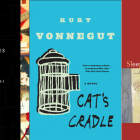Rayna James Wright! And Other Sacrilegious Comparisons
So I was catching up on my Nashville the other day—and by “catching up” I mean “watching the first thirteen episodes of Season 1 back-to-back on Hulu because I’ve had the flu, OKAY?!”—when it hit me:
COUNTRY MUSIC AND POETRY HAVE A LOT IN COMMON.
Then the NyQuil also hit me, and I fell asleep for about fourteen hours, and when I woke up I thought it had all been a dream. But then I watched Episode 14, in which Tami Taylor—er, I mean, Rayna James—performs the following number at her ex-boyfriend-slash-lead-guitarist’s birthday party:
Now, you may be wondering: “Why would someone sing such a bummer of a song at a birthday party, especially when the ex-boyfriend-slash-lead-guitarist-birthday-boy is a former alcoholic?” I know, right?! But we can talk about that later. Because you’ve also probably got more pressing questions, like: “What does any of this have to do with poetry?”
Lots. And not just the obvious stuff, either. It’s kind of a truth universally acknowledged that poetry and country music share various content-level preoccupations, like lost love and new love and old love and yearning and longing and long drives, etc, but what about form? What about moves? What about technique?
And no, I’m not talking about classy stuff like poetry’s debt to the blues, nor am I talking about awesome Brooklyn alt-country bands whose members are really awesome poets (and also my former High School English teachers! Hi, Ms. Moore!). No, I’m talking—for the most part—about Top 40 Country, the cheesy, overproduced, Red State kind that’s got this MFA-holding, Obama-voting, rainbow-flag-flying New York Jew singing along to songs like “Save A Horse, Ride a Cowboy” and “She Thinks My Tractor’s Sexy.”
So, in my defense: a few examples of those “moves” that exist in the Venn overlap between Top 40 Country and Top 40 Poetry (there is a Top 40 Poetry, right?) (Oh.) (Well, there should be):
Sneaky Linebreaks
Let’s start with the inspiration for this post, Pour Me Something Stronger by the (fictional, but whatever!) country legend Rayna James. The chorus shifts a bit throughout the song, but basically goes:
Pour me something stronger
Pour me something straight
All these crooked voices
Make them go away
I can barely stand up
I can barely breathe
Pour me something stronger
Than me…
Those linebreaks are mine, of course, but their overall effect is implied by the song’s titular phrase. The beginning of the chorus sets us up to think about “stronger” as it applies to alcoholic proof: “something stronger” than beer, e.g., would be whiskey. But then, the twist: “Pour me something stronger than me.”
The deeper meaning here is pretty durn obvious, so I won’t spend any more time overanalyzing it. But it’s worth noting that the formal technique—that sneaky linebreak—is beloved of both bar bands and bards. Take, for example, the final line of James* Wright’s poem, A Blessing:
Suddenly I realize
That if I stepped out of my body I would break
Into blossom.
The break between “break” and “into blossom” serves essentially the same purpose as the one between “stronger” and “than me”—it sets up, then subverts, reader/listener expectations. Beyond simple cleverness, there’s also a dramatic payoff—the unexpected twist rouses the reader/listener from his/her complacency, hitting harder than would the more predictable end of the phrase.
*OMG, James and James! If he were still alive, maybe they could collaborate as RAYNA JAMES WRIGHT! (Oh jeez. I’m sorry, James Wright fans. It’s the NyQuil.)
Semantic Nitpicking
Poets and country singers must’ve really loved English class, because they both tend to bring a kind of gleeful close reading to their art. The subject matter isn’t always gleeful, sure, but there’s a clearly some pleasure in the act of dissection that’s taking place in a poem like Dan Albergotti’s Bad Language:
…To know is to understand.
In the Bible to know is to fuck. What do you mean
when you say no? I think I know. I want to know.
Or in the lamenting chorus of Chris Cagle’s What Kinda Gone:
Well there’s gone for good and there’s good and gone
Then there’s ‘gone’ with the ‘long’ before it
I wish she’d been just a little more clear
There’s gone for the day and gone for the night
Gone for the rest of your dog-gone life
Is it whiskey night or just a couple of beers
I mean what kinda gone are we talkin’ ’bout here
Albergotti is arguably more articulate than Cagle, but the game they’re playing is essentially the same: semantic nitpicking as a vehicle for emotional longing. Clinging to precision in the face of the imprecise heart.
Wordplay
Consider the chorus of Toby Keith’s As Good As I Once Was, a cocky lil’ number about an older guy who can still, uh, hold his own with the younger ladies:
I ain’t as good as I once was
But I’m as good once
As I ever was
Or the end of the chorus of Lee Ann Womack’s Little Past Little Rock, a broke-down broken-hearted love song about trying to use physical distance to create emotional distance*:
I’m a little past Little Rock
And a long way from over you
Or Am I the Only Thing That You Done Wrong, also by Womack, or She Took My Keys Away, Now She Won’t Drive me to Drink, by George Jones. Or any number of songs that revolve around a tweaked cliché, like Billy Ray Cyrus & Miley Cyrus’ duet Ready, Set, Don’t Go, or Kenny Chesney’s vacation anthem No Shirt, No Shoes, No Problem. Or songs that delight in simple, silly, punny rhymes, like when Tim McGraw lets out an exuberant pseudo-pottymouthed “Truck yeah!” or when Toby Keith tracks time in beers instead of years.
And then consider the end of Sandra Beasley’s hilarious poem, Vocation:
…If it calls you, it’s your calling,
right? Once I asked a broker what he loved
about his job, and he said Making a killing.
Once I asked a serial killer what made him
get up in the morning, and he said The people.
Or Terrance Hayes’ ecstatic romp through the contranyms in New York Poem, which opens:
In New York from a rooftop in Chinatown
one can see the sci-fi bridges and aisles
of buildings where there are more miles
of shortcuts and alternative takes than
there are Miles Davis alternative takes…
Or those famous lines from Robert Hass:
Longing, we say, because desire is full
of endless distances.
Listen, I’m not saying we should nominate Toby Keith for the National Book Award any time soon. But it feels to me like these various lyrics sprung from the same basic instinct, the same basic glimmer of inspiration: a mischievous urge to play with language, and, as George Strait** famously said, “Make it new.”
*But alas! Which way I fly am hell, myself am hell…
**KIDDING, OBVS.
There are more, to be sure—Keats and Keith serenade the inanimate in Ode on a Grecian Urn and I Love This Bar, respectively; Taylor Swift repurposes Romeo & Juliet in her hit single Love Story; speaking of Shakespeare, maybe his mistress, whose “eyes are nothing like the sun,” is actually Gretchen Wilson’s Redneck Woman, who “ain’t no high class broad,” either.
And for further reading/proof that I’m not totally insane, there’s an entire chapter of Charlotte Pence’s The Poetics of American Song Lyrics devoted to the comparison of country songs to Shakespearean sonnets (and she even quotes Helen Vendler!). And poet Keetjie Kuipers wrote a great blog post about her love of obsessive art forms, cross-country road trips, and David Allen Coe’s You Never Even Called Me By My Name.
Kuipers’ post ends with a small-print postscript:
Though I’m a fan of this particular David Allan Coe song, I’m not a fan of his politics—which make a rather unwelcome appearance in much of his other music.
I feel Kuipers’ pain: I’m a fan of the genre even as its attendent politics make me cringe. But if poetry and Top 40 country can find some common ground, maybe someday we can all just get along…
…and until then, we’ll just have to agree to disagree on most things, but agree on the fact that we all want to marry and/or befriend and/or be mothered by Tami—I mean, Rayna—I mean, the great Connie Britton.



